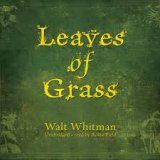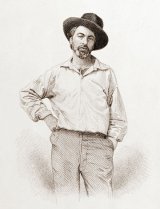Leaves of Grass
Leaves of Grass is a poetry collection by the American poet Walt Whitman (1819–1892). Although the first edition was published in 1855, Whitman spent most of his professional life writing and re-writing Leaves of Grass, revising it multiple times until his death. This resulted in vastly different editions over four decades—the first, a small book of twelve poems and the last, a compilation of over 400.
Come, said my soul, Such verses for my Body let us write, (for we are one,) That should I after return, Or, long, long hence, in other spheres, There to some group of mates the chants resuming, (Tallying Earth's soil, trees, winds, tumultuous waves,) Ever with pleas'd smile I may keep on, Ever and ever yet the verses owning--as, first, I here and now Signing for Soul and Body, set to them my name, Walt Whitman BOOK I. INSCRIPTIONS One's-Self I Sing One's-self I sing, a simple separate person, Yet utter the word Democratic, the word En-Masse. Of physiology from top to toe I sing, Not physiognomy alone nor brain alone is worthy for the Muse, I say the Form complete is worthier far, The Female equally with the Male I sing. Of Life immense in passion, pulse, and power, Cheerful, for freest action form'd under the laws divine, The Modern Man I sing. As I Ponder'd in Silence As I ponder'd in silence, Returning upon my poems, considering, lingering long, A Phantom arose before me with distrustful aspect, Terrible in beauty, age, and power, The genius of poets of old lands, As to me directing like flame its eyes, With finger pointing to many immortal songs, And menacing voice, What singest thou? it said, Know'st thou not there is but one theme for ever-enduring bards? And that is the theme of War, the fortune of battles, The making of perfect soldiers. Be it so, then I answer'd, I too haughty Shade also sing war, and a longer and greater one than any, Waged in my book with varying fortune, with flight, advance and retreat, victory deferr'd and wavering, (Yet methinks certain, or as good as certain, at the last,) the field the world, For life and death, for the Body and for the eternal Soul, Lo, I too am come, chanting the chant of battles, I above all promote brave soldiers. In Cabin'd Ships at Sea In cabin'd ships at sea, The boundless blue on every side expanding, With whistling winds and music of the waves, the large imperious waves, Or some lone bark buoy'd on the dense marine, Where joyous full of faith, spreading white sails, She cleaves the ether mid the sparkle and the foam of day, or under many a star at night, By sailors young and old haply will I, a reminiscence of the land, be read, In full rapport at last. Here are our thoughts, voyagers' thoughts, Here not the land, firm land, alone appears, may then by them be said, The sky o'erarches here, we feel the undulating deck beneath our feet, We feel the long pulsation, ebb and flow of endless motion, The tones of unseen mystery, the vague and vast suggestions of the briny world, the liquid-flowing syllables, The perfume, the faint creaking of the cordage, the melancholy rhythm, The boundless vista and the horizon far and dim are all here, And this is ocean's poem. Then falter not O book, fulfil your destiny, You not a reminiscence of the land alone, You too as a lone bark cleaving the ether, purpos'd I know not whither, yet ever full of faith, Consort to every ship that sails, sail you! Bear forth to them folded my love, (dear mariners, for you I fold it here in every leaf;) Speed on my book! spread your white sails my little bark athwart the imperious waves, Chant on, sail on, bear o'er the boundless blue from me to every sea, This song for mariners and all their ships. To Foreign Lands I heard that you ask'd for something to prove this puzzle the New World, And to define America, her athletic Democracy, Therefore I send you my poems that you behold in them what you wanted. To a Historian You who celebrate bygones, Who have explored the outward, the surfaces of the races, the life that has exhibited itself, Who have treated of man as the creature of politics, aggregates, rulers and priests, I, habitan of the Alleghanies, treating of him as he is in himself in his own rights, Pressing the pulse of the life that has seldom exhibited itself, (the great pride of man in himself,) Chanter of Personality, outlining what is yet to be, I project the history of the future. To Thee Old Cause To thee old cause! Thou peerless, passionate, good cause, Thou stern, remorseless, sweet idea, Deathless throughout the ages, races, lands, After a strange sad war, great war for thee, (I think all war through time was really fought, and ever will be really fought, for thee,) These chants for thee, the eternal march of thee. (A war O soldiers not for itself alone, Far, far more stood silently waiting behind, now to advance in this book.) Thou orb of many orbs! Thou seething principle! thou well-kept, latent germ! thou centre! Around the idea of thee the war revolving, With all its angry and vehement play of causes, (With vast results to come for thrice a thousand years,) These recitatives for thee,--my book and the war are one, Merged in its spirit I and mine, as the contest hinged on thee, As a wheel on its axis turns, this book unwitting to itself, Around the idea of thee. Eidolons I met a seer, Passing the hues and objects of the world, The fields of art and learning, pleasure, sense, To glean eidolons. Put in thy chants said he, No more the puzzling hour nor day, nor segments, parts, put in, Put first before the rest as light for all and entrance-song of all, That of eidolons. Ever the dim beginning, Ever the growth, the rounding of the circle, Ever the summit and the merge at last, (to surely start again,) Eidolons! eidolons! Ever the mutable, Ever materials, changing, crumbling, re-cohering, Ever the ateliers, the factories divine, Issuing eidolons. Lo, I or you, Or woman, man, or state, known or unknown, We seeming solid wealth, strength, beauty build, But really build eidolons. The ostent evanescent, The substance of an artist's mood or savan's studies long, Or warrior's, martyr's, hero's toils, To fashion his eidolon. Of every human life, (The units gather'd, posted, not a thought, emotion, deed, left out,) The whole or large or small summ'd, added up, In its eidolon. The old, old urge, Based on the ancient pinnacles, lo, newer, higher pinnacles, From science and the modern still impell'd, The old, old urge, eidolons. The present now and here, America's busy, teeming, intricate whirl, Of aggregate and segregate for only thence releasing, To-day's eidolons. These with the past, Of vanish'd lands, of all the reigns of kings across the sea, Old conquerors, old campaigns, old sailors' voyages, Joining eidolons. Densities, growth, facades, Strata of mountains, soils, rocks, giant trees, Far-born, far-dying, living long, to leave, Eidolons everlasting.
Translation
Translate and read this book in other languages:
Select another language:
- - Select -
- 简体中文 (Chinese - Simplified)
- 繁體中文 (Chinese - Traditional)
- Español (Spanish)
- Esperanto (Esperanto)
- 日本語 (Japanese)
- Português (Portuguese)
- Deutsch (German)
- العربية (Arabic)
- Français (French)
- Русский (Russian)
- ಕನ್ನಡ (Kannada)
- 한국어 (Korean)
- עברית (Hebrew)
- Gaeilge (Irish)
- Українська (Ukrainian)
- اردو (Urdu)
- Magyar (Hungarian)
- मानक हिन्दी (Hindi)
- Indonesia (Indonesian)
- Italiano (Italian)
- தமிழ் (Tamil)
- Türkçe (Turkish)
- తెలుగు (Telugu)
- ภาษาไทย (Thai)
- Tiếng Việt (Vietnamese)
- Čeština (Czech)
- Polski (Polish)
- Bahasa Indonesia (Indonesian)
- Românește (Romanian)
- Nederlands (Dutch)
- Ελληνικά (Greek)
- Latinum (Latin)
- Svenska (Swedish)
- Dansk (Danish)
- Suomi (Finnish)
- فارسی (Persian)
- ייִדיש (Yiddish)
- հայերեն (Armenian)
- Norsk (Norwegian)
- English (English)
Citation
Use the citation below to add this book to your bibliography:
Style:MLAChicagoAPA
"Leaves of Grass Books." Literature.com. STANDS4 LLC, 2025. Web. 22 Feb. 2025. <https://www.literature.com/book/leaves_of_grass_23>.








Discuss this Leaves of Grass book with the community:
Report Comment
We're doing our best to make sure our content is useful, accurate and safe.
If by any chance you spot an inappropriate comment while navigating through our website please use this form to let us know, and we'll take care of it shortly.
Attachment
You need to be logged in to favorite.
Log In